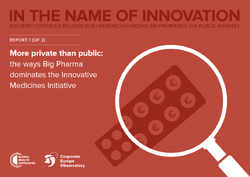Difference between revisions of "Innovative Medicines Initiative"
(Own words) |
m (sponsors) |
||
| Line 6: | Line 6: | ||
|description=Big Pharma capture of EU policy making and budgets | |description=Big Pharma capture of EU policy making and budgets | ||
|constitutes=Big pharma/Lobby,Public-Private Partnership | |constitutes=Big pharma/Lobby,Public-Private Partnership | ||
| + | |sponsors=Vaccine Confidence Project | ||
}} | }} | ||
The '''Innovative Medicines Initiative'''' (IMI) is a European initiative to funnel large amounts of EU money to the [[Big Pharma|Pharmaceutical industry]]. The IMI is a joint initiative (public-private partnership) of the [[European Commission]], representing the European Communities, and the [[European Federation of Pharmaceutical Industries and Associations]] (EFPIA). | The '''Innovative Medicines Initiative'''' (IMI) is a European initiative to funnel large amounts of EU money to the [[Big Pharma|Pharmaceutical industry]]. The IMI is a joint initiative (public-private partnership) of the [[European Commission]], representing the European Communities, and the [[European Federation of Pharmaceutical Industries and Associations]] (EFPIA). | ||
Latest revision as of 09:40, 29 January 2021
(Big pharma/Lobby, Public-Private Partnership) | |
|---|---|
 | |
| Formation | 2008 |
| Sponsor of | Vaccine Confidence Project |
| Sponsored by | European Commission |
| Membership | • European Federation of Pharmaceutical Industries and Associations • European Commission |
| Big Pharma capture of EU policy making and budgets | |
The Innovative Medicines Initiative' (IMI) is a European initiative to funnel large amounts of EU money to the Pharmaceutical industry. The IMI is a joint initiative (public-private partnership) of the European Commission, representing the European Communities, and the European Federation of Pharmaceutical Industries and Associations (EFPIA).
Contents
Own words
With an overall budget of €3.276 billion, the largest biomedical public-private partnership in the world, the Initiative was created to improve health by speeding up the development of, and patient access to, innovative medicines, particularly in areas where there is an unmet medical or social need. This will happen by re-invigorating "the European bio-pharmaceutical sector and to make Europe more attractive for private research and development (R&D) investment in this sector"[1].
Lobby Study
A 2020 study from the NGO Corporate Europe Observatory came with devastating criticism[2][3]. Some of its findings were:
- Although IMI was "created by EU regulations, each PPP’s strategic research agenda and even the annual work plans are proposed by participating companies, who also end up owning the final products."
- IMI has funded a vast array of projects to develop products, technologies, and processes primarily for the benefit of the companies involved, while the consequences for public health, people, and the environment are hardly taken into account.
- The same companies – in consortia with public universities and small and medium-sized enterprises (SMEs) – apply to EU calls for research proposals that they have largely written themselves, ending up in the privileged position to sometimes directly obtain the public funding on offer or, more often, get SMEs and public researchers to work on their favoured priorities and appropriate the outcome afterwards.
- The overwhelming majority of the projects we looked at, the very structure and mechanisms of these public-private partnerships, show that participating companies are controlling the partnerships’ priorities and the use of public EU money for their own direct benefit. And this is not only the result of these companies sometimes abusing the partnership, but also a logical consequence of the way these partnerships were set up.
- Industry influence prevails in IMI’s governance mechanisms, which helps explain why it invests in industry priorities over unmet social needs. While the Governing Board is ostensibly 50-50 split between public officials and the private sector, the Commission takes a hands-off approach to agenda-setting. The groups who are responsible for writing IMI’s agenda are shockingly weighted toward industry, sometimes by as much as a factor of 20-1.
- In the name of innovation in health research, the pharmaceutical industry represented by pharmaceutical trade association and lobby group EFPIA (European Federation of Pharmaceutical Industries and Associations), has steered a €2.6 billion public EU research budget for the period 2008-2020 through IMI, but has so far failed to meaningfully invest in research areas where public funding is urgently needed. These areas include long-term preparedness for epidemics (including caused by coronaviruses), HIV/AIDS, and poverty-related and neglected tropical diseases. Instead the partnership mostly used the budget to fund projects in areas that were more commercially profitable for the pharmaceutical industry.
Sponsor
| Event | Description |
|---|---|
| European Commission | The executive body of the European Union, responsible for proposing legislation, implementing decisions, upholding the EU treaties and managing day-to-day business. |
